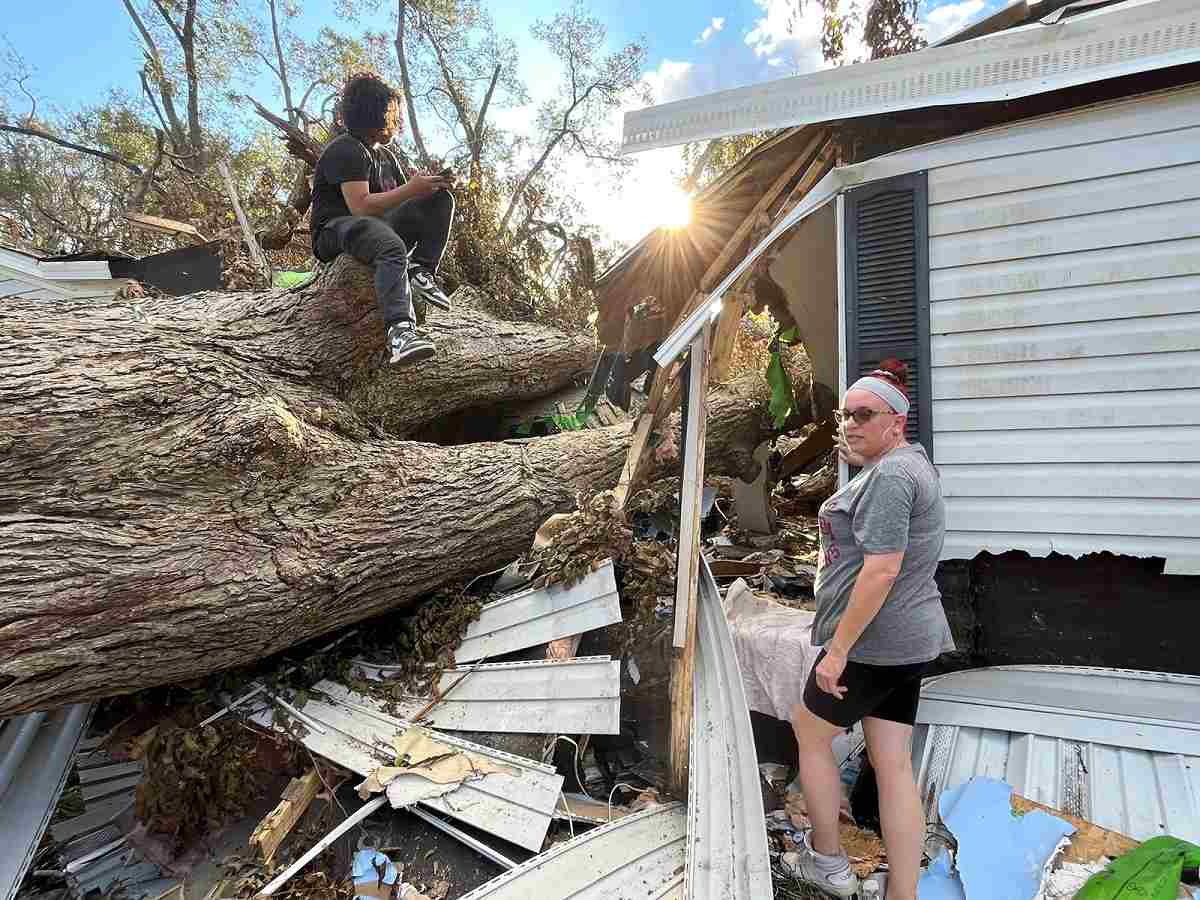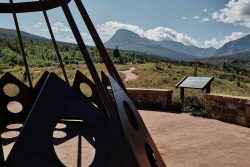Not Far from N.C. Another Hurricane Disaster Unfolds. and It’s Hardly the First Time.

Melissa Williams and her son Thayden, 16, stand in the wreckage after Helene sent the seedling pecan tree in their yard crashing through their mobile home in Valdosta.
15:32 JST, October 7, 2024
LAKE PARK, Ga. – It was so sweltering and stuffy in Joellen Cooper’s mobile home, it seemed as though even the roaches had stopped moving for a minute.
Oreo, her ailing 16-year-old cat, hung off the back of her La-Z-Boy, panting faintly. If the power didn’t come back on soon, she worried briefly, he might die like that. That mangy, pencil-thin animal is the most important thing she has, aside from a painting that belonged to her mother. The hurricanes have ruined most everything else.
In August last year, Hurricane Idalia hit her tucked-away, woodsy neighborhood of mostly old mobile homes and the rest of Lowndes County harder than any storm residents could remember. The winds rattled Cooper’s unit like a dryer, she recalled, caving the roof in, and leaving the 69-year-old and thousands more without power for about a week. This past August, Tropical Storm Debby’s gale force winds again knocked out their electricity. Then a month later, Helene.
Three storms in 13 months alone is devastating, but here, they’ve exacerbated underlying problems that will make the recovery harder and take longer. High rates of poverty, a lack of insurance, limited access to healthy food, and unstable, shoddy housing – all these factors keep many on edge. So the costs of losing power, refrigerated food, time at work and crops, on top of the physical damage, could cripple thousands for months and years to come.
Hitting as a Category 1 on Sept. 26, the hurricane swung through this rural, agricultural region 90 miles inland from Tallahassee with such a force that it uprooted, snapped and tossed an untold number of pine and massive pecan trees onto homes, cars and power lines, and across hundreds of roads. Its 130-mph winds bent steel-poled football scoreboards flat onto their fields. Historic brick buildings crumbled, ribbons of metal roofs ended up twisted or dangling from factories.
The Valdosta region looks – as almost every resident said – “like a bomb went off,” and it’s like that for towns over. At least 33 people have died in Georgia, of 229 total so far.
George Hernandez Mejia, who directs emergency operations for CORE, a disaster response organization that embedded in Valdosta after Idalia struck last year, said the area’s population is “lower income, more marginalized, and overall a greater difficulty in recovering from something like this, let alone two of them happening back to back.”
“We are seeing that on the ground now,” he added.
Cooper, for example, was doing all right, but just barely. She’s been retired for some time from working at McDonald’s and the Dollar General. Social Security gives her $906 a month. “Don’t forget the six,” she instructed. “That’s important.”
She’s owned her mobile home for more than two decades and gave up on insurance long ago because of the cost. Besides, she didn’t think she’d need it. Between groceries, the food she buys for Oreo and a dozen other feral cats, and medical bills – hers, and Oreo’s – she’s left with zero at the end of the month. Replacing a sodden roof? “Not a chance in hell,” she said.
So she adjusted to living with Idalia’s scars, even as her home fell apart.
“I swear it never used to look like this,” she insisted, gesturing to the moldy insulation hanging from the exposed rafters in her white ceiling and the water stains on her cracked pink walls. When she put her hand on her fridge, dozens of small cockroaches shot out from under a drawing of a smiling snowman, colored by one of her grandkids. To talk about Helene, she needs “a smoke.”
“This don’t happen in Georgia,” Cooper insisted, flicking her cigarette. “I grew up in Georgia. I – we’re not used to this. This is devastating. I cry a lot, but I can’t help it.”
Hidden damage
No neighborhood in the Valdosta area went untouched, according to officials: Almost every road is still littered with tree trunks and limbs, the piles often standing taller than the average adult. Electrical lines intertwine with broken branches or hang so low that cars have to swerve to avoid them. Without enough line workers to repair the infrastructure, some have come from as far away as California for this job, which is difficult and meticulous.
Hundreds of thousands of people across multiple southern Georgia counties have been without power for a week, sleeping in their cars to escape the heat in their homes and barbecuing breakfast outside. Running water still eludes the mobile home communities and apartment complexes that run on wells, because their pumps don’t work without electricity. Kids have been filling up buckets of creek water so their families could flush their toilets.
In the more rural towns and farmsteads outside Valdosta, like in Lanier County, some residents are bracing to be offline for a month or more.
But people here have not been complaining. After Idalia, they know what to do. Lowndes County officials have learned how to immediately set up supply distribution centers. Jessie’s Restaurant is prepared to cook breakfast and lunch for hundreds on their sidewalk downtown, thanks to donations and generators. Volunteers know what ready-to-eat meals are and to get boxes quickly to elderly residents, like Cooper, who don’t drive.
But Valdosta is, as one resident put it, “a paycheck to paycheck town.” The city’s poverty rate is one of the highest in the United States. Some rural towns across the entire metropolitan area – which is roughly the size of Rhode Island – have it worse, with more than one in five residents living below the poverty line. In Lake Park, the small town where Cooper lives, the poverty rate is 35.4 percent.
And many people, and their needs, are more hidden. You have to know where to find them, Hernandez Mejia said.
Cooper lives on a nondescript dirt road thickly lined with canopied trees about 20 minutes outside of town. She didn’t know how, or who, to ask for help after Idalia. Some of her neighbors have been in the same situation. Take John Rogers, a sweet, upbeat 74-year-old with Type 2 diabetes and one good ear who just let the hole Idalia tore in his bathroom ceiling “let the outside in” since he wasn’t able to fix it.
The mold that grew over the past year now covers the walls so extensively that it looks like black paint peeled off to reveal the white underneath. Helene ripped the roof of his manufactured house nearly clean off. Sitting outside on his sixth day without power, looking at the black rubber roofing now on his porch, he wondered if his house needed to be demolished. But then where would he go? He doesn’t drive, doesn’t own a computer, and remembers his flip-phone number by carrying it around on a piece of paper.
Plus, his health isn’t great. Most people interviewed for this article said they or a family member are dealing with serious issues: Asthma. Heart problems. A 2022 South Georgia Medical Center needs assessment spanning nine counties found there was a prevalence of “diabetes, hypertension, heart disease, overweight, obesity, and cancer” in the region, but not enough care because many are uninsured.
That’s been playing out in Clinch County, which has 6,900 people spread across hundreds of miles of farm land. The Memorial Hospital has been at maximum capacity since the storm, according to its CEO Andrea Handley, a first. Plus they’ve also been feeding 600 people every day; with schools closed, many kids otherwise wouldn’t eat.
And, if that wasn’t enough stress, as Jessie Johnson-Charoo put it, “Landlords out here don’t play.” On Oct. 1, less than a week after Helene hit, two residents said their property managers posted letters stating that the rent was due even though the power was still out.
“Tough times in Valdosta!!!” read one notice, obtained by The Washington Post. “This is one of the worst, if not THE WORST, natural disaster we’ve ever seen … Like you we cannot wait for the power … and the AC to come back on!!! But unfortunately … time does not stand still!!”
Because of rising rents and a lack of state protections, evictions have been spiking across southern Georgia during the past few years.
In the Val Del mobile home park in Hahira, a small community outside Valdosta, Vicki Lawrence had to hustle to submit her $450 rent check – about half of what she gets every month – by Oct. 5 to avoid a $150 late fee. Lawrence, 67, a retired factory worker, doesn’t have a bank account. Using a service called Plastiq, she sends her rent from her nearby Walmart. But that store had been closed because of damage.
She made the payment, even though she had been living without water and power for days at that point. Lawrence said the new owner has not responded to her and other residents’ demands for a generator to get the park’s well water pumping again.
Attempts to reach Lawrence’s landlord by email and phone Sunday were unsuccessful.
Sitting on her screened-in porch, her pit bull, Roxy, panting beneath her, she pointed to two big buckets. “That’s what I’ve been using to flush my toilet,” she said.
Once a day, her grandchildren go to the nearby creek and fill them up, one for her house, one for them. She’s been spending most of her days outside not just because it’s hot, but because the thickening stench of sewage from the septic tank has made her home nauseating.
“I haven’t lived like this since I was a kid. I grew up in real poverty, in the country, in a little coal mine town. We didn’t have no water,” she said. “My god, that is so far in my past I never thought I’d be back there again but here I am.”
‘Brushed under the rug’
Valdosta’s recovery, though, is lurching forward. By Sunday, more homes had their lights back on. Lawrence got power, and flushed her toilet. CORE and other disaster response organizations began repairs, tarping Rogers’s and Cooper’s roofs.
Cooper has three children spread across the area: When they get their power back, she said, “They’re going to figure something out for me.” They’ll probably tear down her decaying home and try to find her a small mobile home, so she can stay home but start over.
Even with promises from former president Donald Trump and President Joe Biden, who both visited Valdosta, many wonder how there will be enough resources to help them given the widespread devastation.
And this area is used to being “brushed under the rug,” said Melissa Williams, whose family had a close escape during the storm, because bigger cities “get more attention.”
Williams’s father, a triple amputee, was sitting in his usual recliner in the living room surrounded by her two sons and dogs when they started to hear strange sounds on the roof. And then, “thwack, boom, crunch” and they were levitating as the gigantic seedling pecan tree from their front yard was nearly on top of them. They bolted to take cover in a door frame, but that started to crack too. A branch hit Williams’s 24-year-old son in the head so hard, she said, he started throwing up, “concussed.”
Williams, 43, grew up in South Florida. She lived through Hurricane Andrew in 1992. But Helene? This storm, she said, “looked at Andrew and said hold my beer.”
Two years ago, Williams moved up to Valdosta and in with her dad to take care of him and get out of an abusive relationship, she said. Now a single mom, she makes $30,000 a year as a full-time DJ and a part-time caterer.
The past year, though, has tested her more than most. They’d just finished repairing the roof panels that Idalia damaged when Helene hit. Her father recently had a stroke and stents put in his heart. After the tree cut their home in half last week, he almost had another one, she said, choking up.
Williams and her sons, who are staying with a family member, have returned over the past week to try to salvage what they can. Mail, a new package of toilet paper, her expensive DJ speakers, eggs, computers, a crockpot and a food saver are all still there – buried under the trunk, now covered in dirt, big black ants and spiders. They have renter’s insurance and applied for FEMA aid, but like many here, have no idea whether it will be enough to start over.
But she feels blessed she’s still here, and said this disaster will make her and her community stronger.
“One thing I’ve learned about this crazy world is that it’s going to be crazy,” Williams said. “It’s going to be a whirlwind. It’s going to be rough, but this too shall pass.”
And she’s back at work. Around 7 p.m. Thursday, Williams set up for her usual karaoke night in the front corner of El Paso Tacos & Tequila, one of the few restaurants open in Valdosta’s historic downtown, with rented DJ equipment.
Dusty, dirt-smeared workers sat at one table, a few out-of-state power line workers at another. A group of college students laughed, their heads bent over cellphones. There was a birthday party. A few locals sat at the bar, one man describing how a tree fell straight through his house. Almost everyone was drinking bright-colored, extra-large margaritas.
A few of her regulars were there, taking the mic multiple times to belt out hits like Montell Jordan’s “This is How We Do It” into the half-empty room. Williams joined each time, singing back-up or as a duet.
Eventually, as it always does, Journey’s “Don’t Stop Believin’” came on.
“Just a small town girl, living in a lonely world,” Williams sang, her voice rising. The chatter stopped. Bar stools swung around and everyone chorused: “Took the midnight train goin’ anywhere …”
And for a moment, it felt like just another Thursday night.
Top Articles in News Services
-

Survey Shows False Election Info Perceived as True
-

Hong Kong Ex-Publisher Jimmy Lai’s Sentence Raises International Outcry as China Defends It
-

Japan’s Nikkei Stock Average Touches 58,000 as Yen, Jgbs Rally on Election Fallout (UPDATE 1)
-

Japan’s Nikkei Stock Average Falls as US-Iran Tensions Unsettle Investors (UPDATE 1)
-

Trump Names Former Federal Reserve Governor Warsh as the Next Fed Chair, Replacing Powell
JN ACCESS RANKING
-

Producer Behind Pop Group XG Arrested for Cocaine Possession
-

Japan PM Takaichi’s Cabinet Resigns en Masse
-

Man Infected with Measles Reportedly Dined at Restaurant in Tokyo Station
-

Israeli Ambassador to Japan Speaks about Japan’s Role in the Reconstruction of Gaza
-

Videos Plagiarized, Reposted with False Subtitles Claiming ‘Ryukyu Belongs to China’; Anti-China False Information Also Posted in Japan

























